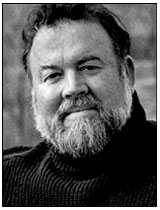Books |
Andre Dubus: Selected Stories
By
Published: Nov 08, 2022
Category:
Fiction
He was a small boy from Louisiana who listened to the opera on the radio on Saturday afternoons. When he graduated from college, he joined the Marines. And he got strong and thick in the chest, and later, when he grew a beard, he looked like Ernest Hemingway.
Andre Dubus wrote a bit like Hemingway — that is, he wrote about people saying bluntly what they meant, people who cheated and swore and, sometimes, killed — but he didn’t have Hemingway’s fame. He couldn’t. Hemingway wrote novels that became bestsellers and movies. Dubus wrote short stories.
"I love short stories because I believe they are the way we live," he wrote. "They are what our friends tell us, in their pain and joy, their passion and rage, their yearning and their cry against injustice." Watch a short profile.
I interviewed Andre Dubus in the early 1980s. He lived north of Boston, in one of those towns where no one you know has ever lived. He was married to a young writer, and this marriage, his third, seemed to be the keeper. There were children, and teaching, and the slow, steady pile of stories. He was a delightful conversationalist — “Why do I go to Mass every day? Because if Ronald Reagan defines ultimate reality, I’d have to shoot myself!” – and fun to profile. The piece I wrote about him for a now-defunct arts magazine was good enough that his picture was on the cover. He hadn’t experienced praise like that; he cried when he read it.
He got more attention in 1986. He was driving home late one night when he spotted a car on the side of the highway. He stopped to help two motorists. Another car swerved toward them. Dubus shoved the woman out of the way. In the crash, the man was killed instantly. Dubus had 34 broken bones — and both legs crushed below the knee.
His choice, he was told, was a long rehab or one leg amputated above the knee. He had work to do, kids to support — he took the surgery. He still needed three years of rehab. And his wife left him.
Friends rallied. Kurt Vonnegut, Ann Beattie, E.L. Doctorow, Gail Godwin, Stephen King, Tim O’Brien, Jayne Anne Phillips, Richard Yates and John Updike gave readings to help him out. He won a MacArthur Genius Award. But writing came harder, and it broadened — he became a chronicler of disability.
And then, in 1999, he died. He was 62. He left behind six children, one of them the writer Andre Dubus III.
If you have never read Dubus, you may have seen a movie adapted from one of his stories. It’s called “In the Bedroom” and it’s about a father who has to go on living in the same town with the guy who killed his son. It’s a classic Dubus conflict: wounded people, difficult situation, moral choices. Nothing “clever” or “literary” here, nothing that the New York crowd can easily relate to. Watch the movie preview.
That story, called “Killings” is as good an introduction to Dubus as any. It’s pure storytelling — just character and plot. Or as a guy says in one of his stories, “It gets down to what’s happening to you right now.” Like: a woman, raped by her husband, and what happens when she gets a gun. Like: a cratering marriage, both husband and wife unfaithful, she with a priest. Like a man who falls in love with his son’s wife. [To buy the book from Amazon.com, click here. For the Kindle download, click here.]
I can make these stories sound even more downbeat by telling you that none of the characters in a Dubus story is much of a success. The teachers are assistant professors and instructors in small colleges. The women are waitresses and housewives. The houses are cramped, often with full ashtrays and sinks with dishes stacked high. And money — the shortness of, that is — is a silent villain throughout.
And yet these are glorious stories. First, for the writing, which is simple and unadorned and more like Chekhov than a lot of writing that’s called Chekhovian. But even more, because their creator loves every character he created, loves them equally for their hopes and dreams and flaws. Not many writers could put restrained desire like this:
On a Thursday night in early autumn she nearly committed adultery, was within minutes of consummating it, or within touches, kisses; it was difficult to measure by time or by her mouth and tongue and hands, or by his.
A father, dropping his kids off at his ex-wife’s house in winter, realizes that the condensation on the windows is the warm breath of his children. A wife, miserable beyond measure, gets that she doesn’t truly hate her husband; if she did, she could leave. And there are so many more remarkable people to meet, people you see in convenience stores and in strip malls, people you’re not likely to know.
Dubus loved them all because he was them all — the macho guy who lifted weights was a warehouse of compassion and empathy. To read these stories is to admire the life’s work of this too little known writer. And it’s to feel fresh respect for the struggles we all face — to become, if only briefly, a slightly better person.


